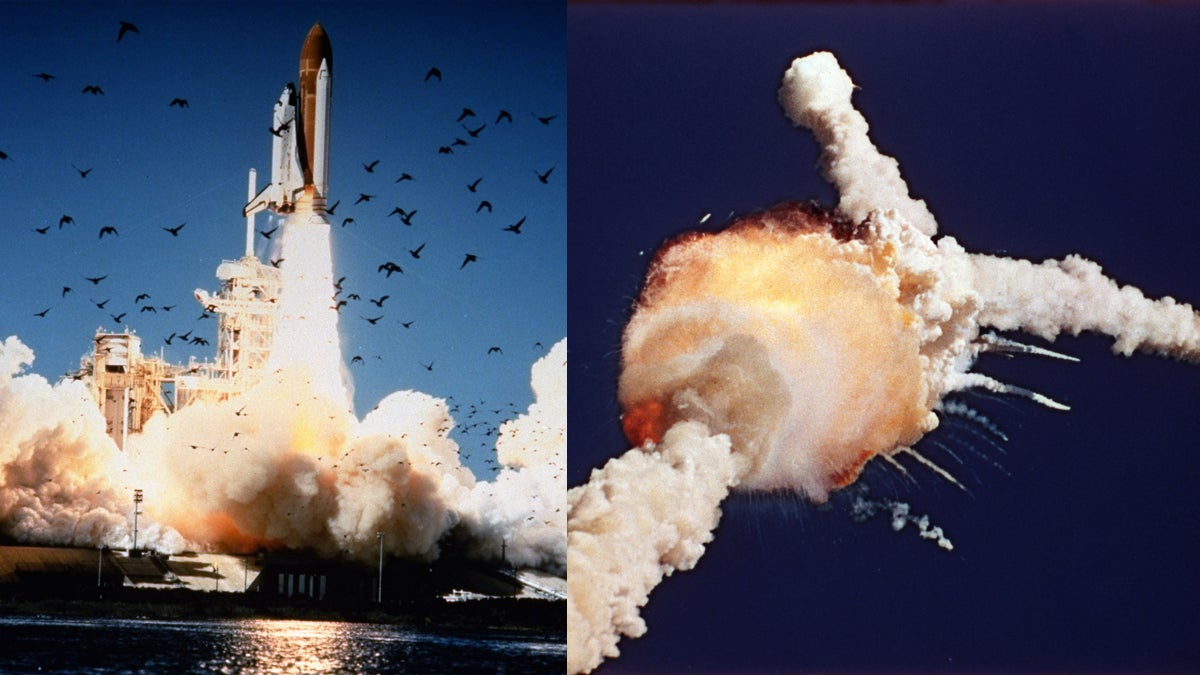Thirty years ago today: ‘Obviously a major malfunction’

The Space Shuttle Challenger lifts off (left) and explodes shortly after over the Kennedy Space Center, Fla., Tuesday, Jan. 28, 1986. All seven crew members died in the explosion, which was blamed on faulty o-rings in the shuttle's booster rockets. The Challenger's crew was honored with burials at Arlington National Cemetery. (Bruce Weaver/AP Photo)
We interrupt saturation coverage of Trump the tinpot tyrant – who presumes to think he can dictate the terms of engagement, who presumes to think he can veto a free press – in order to mark a dark day in American life.
Thirty years ago this morning, NASA’s Challenger blew up on live TV.
Until 9/11, that was arguably our most horrific contemporary moment, a national trauma shared in real time by tens of millions – most notably, kids in classrooms who watched it on CNN because an elementary school teacher from New Hampshire had strapped in for the vertical ride. Today, most Americans 40 and older can probably remember the shock of watching that orange-white fireball in a bright blue sky – and hearing the laconic NASA techie: “Flight controllers looking very carefully at the situation. Obviously a major malfunction.”
We had come to assume that space travel was safe, so safe that it was deemed routine, so routine that we were bored by the shuttles’ launchings and landings. Challenger had already completed nine missions; the attraction of the tenth was Christa McAuliffe. We were willfully blase about the dangers – but, soon enough, we were cruelly reminded that the success of these daring endeavors, and the lives of the pioneers on board, hinged on decisions made by scandalously imperfect humans.
President Reagan, addressing the nation that night, tried to calm us with tough love: “I know it’s hard to understand, but sometimes painful things like this happen.” But, as investigators later discovered, the painful things would not have happened if the humans in charge had not been so willfully deaf to evidence that should have been heeded.
Challenger was launched on a Florida morning when the temperature was 30 degrees. Tiny rubber seals (“O-rings”) became brittle in the cold. Because they were brittle, because they lacked flex, they failed to seal the solid rocket booster that had propelled Challenger into the sky. Within 73 seconds of launch, flames broke out of the booster and ignited the external fuel tank. A nation had to watch those seven people die.
It turned out, of course, that the decision-makers had screwed up. NASA had never launched in freezing weather, and some of the folks responsible for the O-rings had warned – six months before the launch – that the rubber could stiffen under those conditions. Roger Boisjoly, a booster rocket engineer at Morton Thiokol, a NASA contractor, had written a memo stating that a cold-weather launch could trigger “a catastrophe of the highest order,” with “loss of human life.”
But on the eve of the Jan. 28, 1986 launch, Boisjoly’s warnings – buttressed by his colleagues – were overruled. NASA had repeatedly postponed Challenger‘s launch that month, for weather reasons, and it was anxious to get going. According to the investigations, and press reports, NASA officials basically told the pessimists to take a hike. NASA’s George Hardy reportedly told Boisjoly and his Thiokol colleagues: “I am appalled. I am appalled by your recommendation.” Another NASA guy, Lawrence Mulloy, chimed in: “My God, Thiokol. When do you want me to launch – next April?”
The government panel appointed by Reagan issued a damning verdict – dry language notwithstanding. “Failures in communication…resulted in a decision to launch based on incomplete and sometimes misleading information, a conflict between engineering data and management judgments, and a NASA management structure that permitted internal flight safety problems to bypass key Shuttle managers.”
A subsequent congressional report went further: “The fundamental problem was poor technical decision-making over a period of several years by top NASA and contractor personnel, who failed to act decisively to solve the increasingly serious anomalies in the Solid Rocket Booster joints.”
These days, of course, we’re accustomed to finding folly in high places. Donald Trump probably thinks he’d cure that, he probably thinks that he’d ensure perfection at NASA by bringing in duh best great terrific people – but unless or until that day arrives, let’s remind ourselves that the explorers of the next frontier (six people are in space right now!) are bravely risking their lives with no guarantee of return. Mindful as we are of human FUBARs, we should spare a sec to salute them.
——-
But about Trump, and his refusal to join tonight’s debate because Megyn Kelly is supposedly such a biased moderator…
I recommend that you watch this priceless video. At the tail end of 2011, Trump was tapped to moderate a Republican presidential debate sponsored by Newsmax TV, a conservative outlet. But most of the candidates refused to show up, and Trump was very displeased. In an interview on Fox News – conducted by Megyn Kelly – he denounced the refusers as cowards:
“We’re not seeing a lot of courage here are we?…Not lots of courage, these Republicans are supposed to be brave.”
Trump also compared his moderating skills to Kelly’s: “I could never beat you, that wouldn’t even be close. You have done a great job by the way, and I really mean it.”
I’ll leave it at that.
Follow me on Twitter, @dickpolman1, and on Facebook.
WHYY is your source for fact-based, in-depth journalism and information. As a nonprofit organization, we rely on financial support from readers like you. Please give today.

